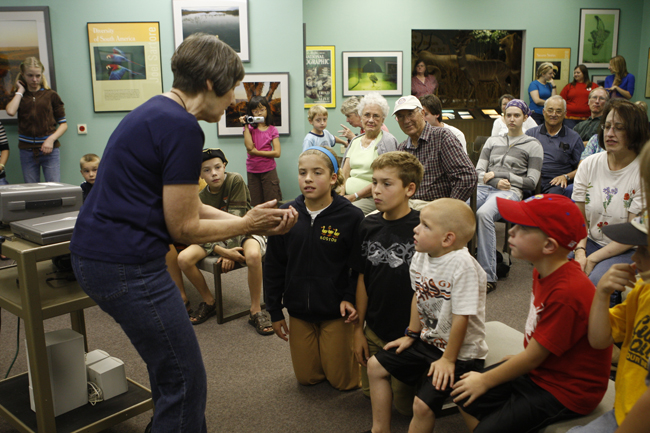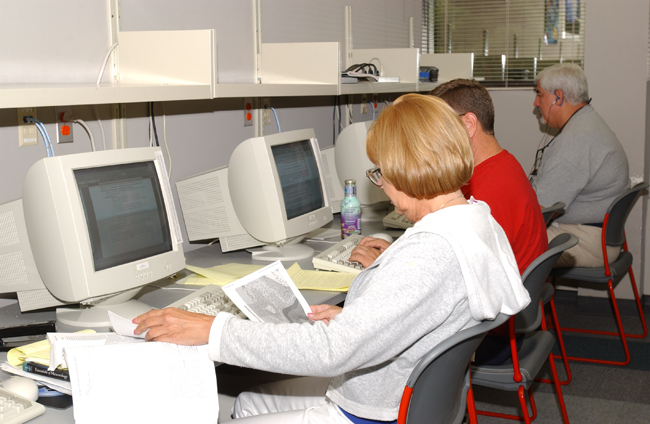CHAPTER 6: CRITERION FOUR: ACQUISITION, DISCOVERY, AND APPLICATION OF KNOWLEDGE
Core Component 4a: The organization demonstrates, through the actions of its board, administrators, students, faculty, and staff, that it values a life of learning.
Core component 4b: The organization demonstrates that acquisition of a breadth of knowledge and skills and the exercise of intellectual inquiry are integral to its educational program.
Core component 4c: The organization assesses the usefulness of its curricula to students who will live and work in a global, diverse, and technological society.
Core component 4d: The organization provides support to ensure that faculty, students, and staff acquire, discover, and apply knowledge responsibly.
Criterion Four Summary
The organization promotes a life of learning for its faculty, administration, staff, and students by fostering and supporting inquiry, creativity, practice, and social responsibility in ways consistent with its mission.
Core Component 4a: The organization demonstrates, through the actions of its board, administrators, students, faculty, and staff, that it values a life of learning.
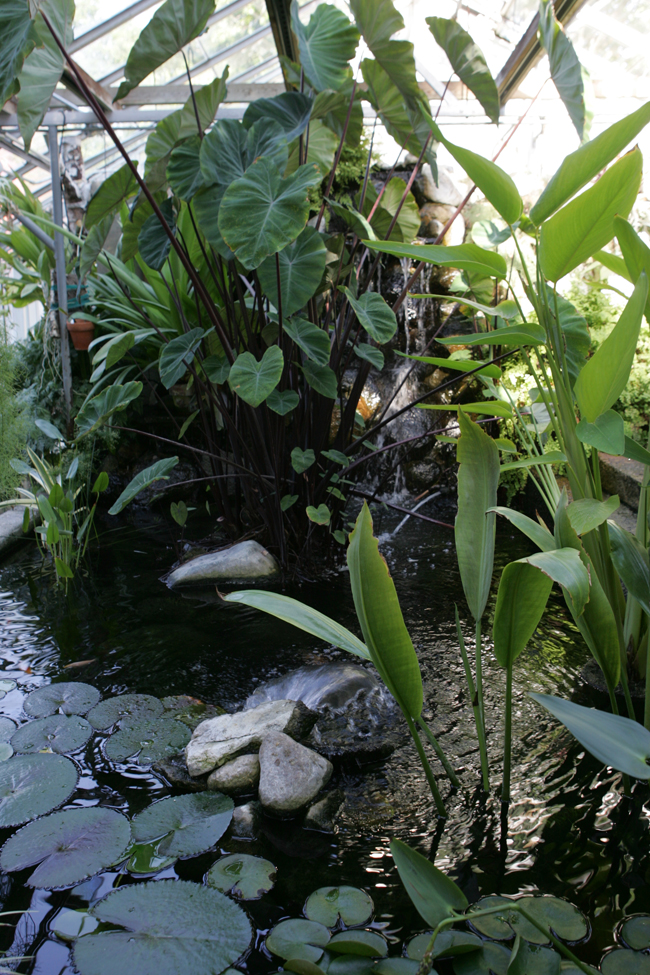 UNI faculty and students actively pursue learning and the creation of knowledge in classrooms, laboratories, and studios across campus as well as field sites across the country and world. UNI faculty are increasingly able to secure external funding for research, and students have many research and co-curricular opportunities. UNI is committed to the idea that the University identifies as a policy that “The basic functions of the university are the advancement and dissemination of learning, the development of critical intelligence, creative talent, aesthetic sensibility and moral awareness in its students.” [1] The concept of intellectual inquiry is similarly embedded in the first three goals of the 2004-2009 University Strategic Plan, to “provide intellectually challenging…experiences,” “maintain a faculty distinguished by their creative and intellectually rigorous teaching and scholarship,” and involve the university in “addressing critical local, state, national, and global needs.” [2]
UNI faculty and students actively pursue learning and the creation of knowledge in classrooms, laboratories, and studios across campus as well as field sites across the country and world. UNI faculty are increasingly able to secure external funding for research, and students have many research and co-curricular opportunities. UNI is committed to the idea that the University identifies as a policy that “The basic functions of the university are the advancement and dissemination of learning, the development of critical intelligence, creative talent, aesthetic sensibility and moral awareness in its students.” [1] The concept of intellectual inquiry is similarly embedded in the first three goals of the 2004-2009 University Strategic Plan, to “provide intellectually challenging…experiences,” “maintain a faculty distinguished by their creative and intellectually rigorous teaching and scholarship,” and involve the university in “addressing critical local, state, national, and global needs.” [2]
To accomplish these goals, UNI ensures that faculty and students are supported in their pursuit and dissemination of knowledge. As a result, UNI has many institutional resources available to the campus community. Indeed, the UNI policy on Ethics and Academic Responsibility explicitly states that “The university… must provide such an atmosphere of intellectual freedom for its faculty. The faculty, in turn, must uphold this freedom in all its actions.” [3] In exchange for that intellectual freedom, faculty are committed to upholding ethics and standards in research and publication and to providing those freedoms to students by encouraging and protecting student rights to intellectual freedom in research and classroom activities. The result is that UNI, though supporting the acquisition and dissemination of knowledge, promotes a campus community dedicated to lifelong learning.
SUPPORT FOR FACULTY DEVELOPMENT AND RESEARCH IN LEARNING
The University supports and rewards research, scholarship, and creative activities through a variety of mechanisms.
- Professional Development Assignments (PDA), as provided for under Article Seven of the UNI Master Agreement, are competitive awards for tenured faculty to conduct research or other scholarly and professional activity for a semester or academic year. Faculty are eligible for PDA awards every three years.
- Summer Fellowship grants are provided for faculty to conduct research, undertake creative activities, or write grant applications.
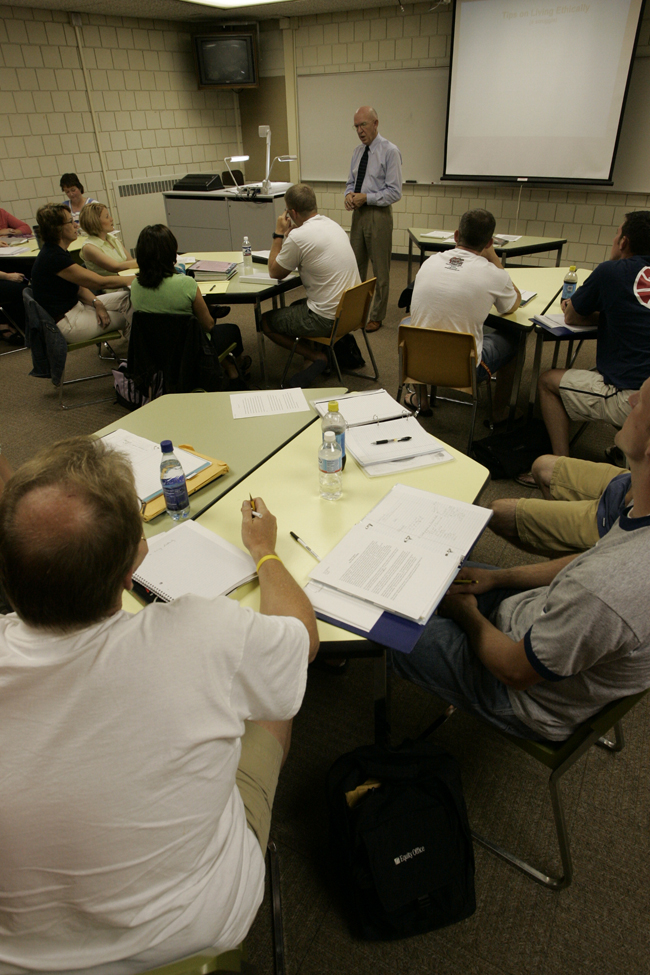 Several colleges offer research funds to assist faculty in developing larger, grant-funded projects. Examples include the College of Social and Behavioral Sciences Projects Grant and College of Humanities and Fine Arts Faculty Development grants.
Several colleges offer research funds to assist faculty in developing larger, grant-funded projects. Examples include the College of Social and Behavioral Sciences Projects Grant and College of Humanities and Fine Arts Faculty Development grants.- The James Lubker Faculty Research Award has been created with an annual cash prize for excellence in research and scholarship intended to facilitate continued research efforts. The Distinguished Scholar Award is sponsored by the Graduate College and is given to recognize eminent and distinguished scholars and artists among the faculty. The award is a cash prize to provide continued support for research or creative activity.
- UNI supports faculty and student research and creative activities through support for travel to conduct research and to participate in conferences and shows to present results. Faculty travel to merely attend conferences or performances generally is not supported. As directed by the Master Agreement, the Board of Regents allocates money for faculty travel; the support for FY09 was $352,287. There is no clear pattern in travel allocations by college. In most cases, departments indicated that additional money is available for research travel from college offices to supplement the department allocations. Despite the availability of travel support there is a widening gap between the actual cost of professional travel and the support the University is able to provide.
Office of Sponsored Programs
The Office of Sponsored Programs (OSP) assists faculty in research and creative activities. The Office provides support for grant development, identification of funding agencies, assistance with grant submission, and management of funds. The OSP also provides assistance in managing intellectual property issues such as patents, copyrights, and trademarks. It also coordinates research policy, providing leadership and assistance for the Institutional Review Board to protect human and animal research subjects, and providing training and guidelines in ethical research. The OSP also maintains a searchable Professional Interest Database that identifies the research interests of faculty on campus.
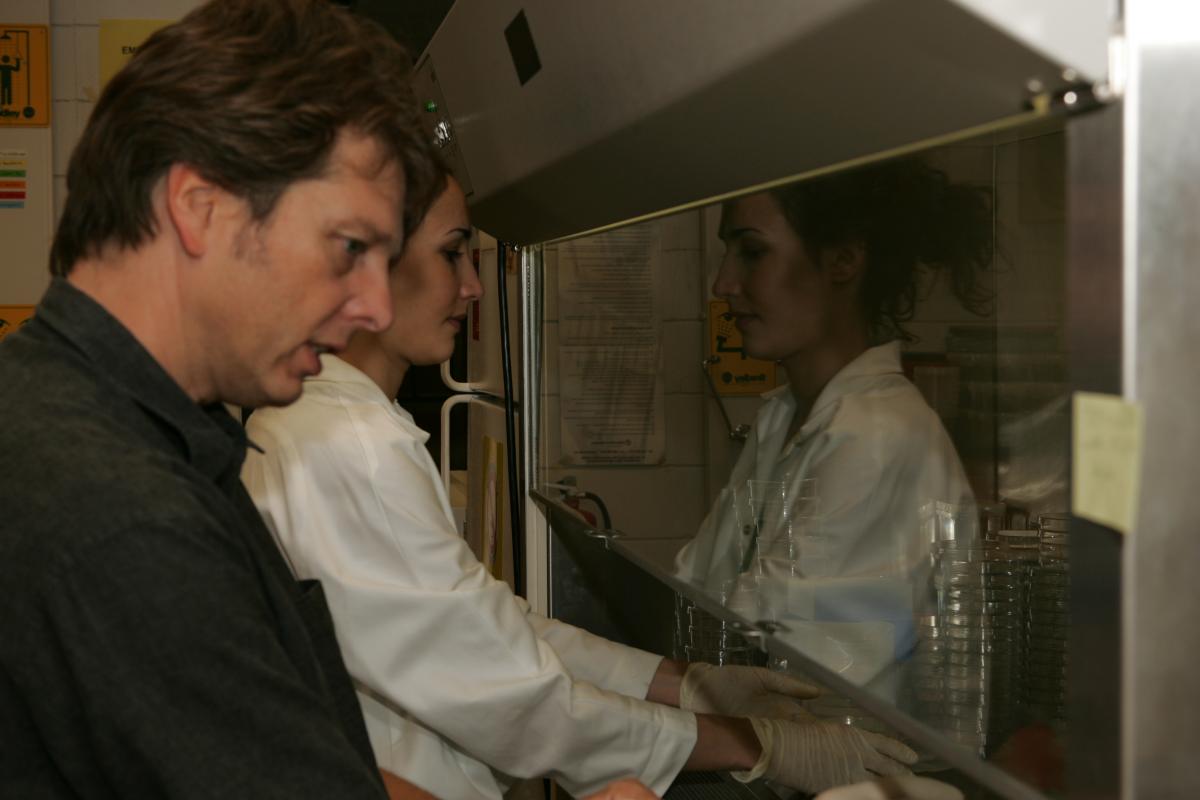 Funding through the Office of Sponsored Programs has steadily increased over the years, indicating a growing commitment by UNI faculty and administration to the value of learning through research and an increased emphasis on externally funded research. Externally funded projects have increased significantly since the last reaccreditation visit. External funding generated slightly over $19 million in FY01. That figure has steadily grown and in FY08 had increased by 90% to $36.8 million.
Funding through the Office of Sponsored Programs has steadily increased over the years, indicating a growing commitment by UNI faculty and administration to the value of learning through research and an increased emphasis on externally funded research. Externally funded projects have increased significantly since the last reaccreditation visit. External funding generated slightly over $19 million in FY01. That figure has steadily grown and in FY08 had increased by 90% to $36.8 million.
Although both competitive grants and Congressionally directed funds remain important components of University funding, competitive awards have recently become more important. External funding comes from a variety of federal, state, local, and private sources. The dominant source of funding, however, is from federal agencies, which account for 60% of external funding for UNI (Table 6.1). UNI ranked in the upper 30% of all universities that received federal science and engineering support in a 2005 NSF survey. [4]
Table 6.1 Percent distribution of sources of external funding

The University research community, in conjunction with OSP, has worked hard to diversify both the source of funding and the types of projects funded by external grants. For example, UNI has taken the lead among the three Regent institutions in seeking Experimental Program to Stimulate Research (EPSCOR) grants from the National Science Foundation. The proportion of research-based grants remains relatively low; however, a clear strength of UNI is in public service activity, which accounts for the largest proportion of external funding (Table 6.2). These grants include high-award projects from private foundations, federal agencies, and the State of Iowa to programs such as the Iowa Initiative Intervention, the Camp Adventure program, and the Iowa Air Emission Assistance Program.
Table 6.2 Total annual external awards for UNI as accounted by the Office of Sponsored Programs divided by OSP codes for grant purpose
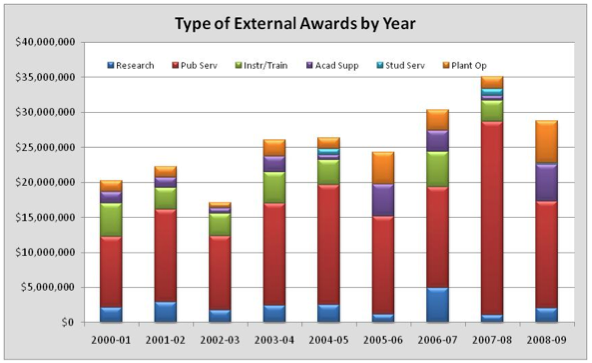
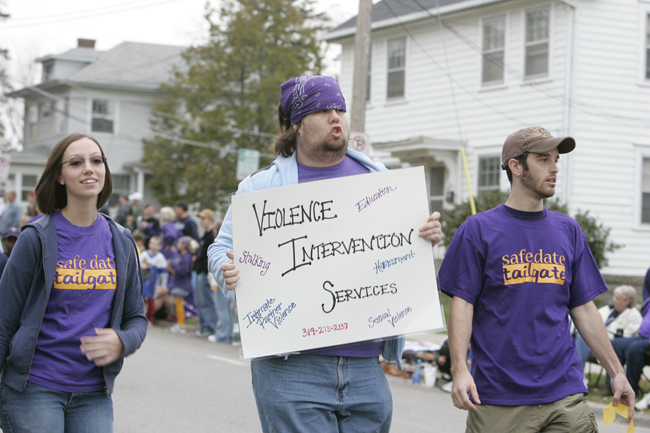 One of the University’s priorities is to be a leader in the enhancement of the economic, social, and cultural development of Iowa. This is supported by a strong focus on public service and instructional and training grants. For example, UNI received a federal grant for a program on “Engaging Iowa in Science and Mathematics” which was designed to involve elementary and middle-school students in science and math activities, develop a pilot program to support student teaching in the fields, and provide resources for teachers to learn about the latest science teaching methods. Consistent dedication to and success with academic support grants in widely ranging fields like education, geography, mathematics, physics, biology, and business are strong indicators of the commitment to being the leading public undergraduate institution in the state of Iowa. Student services grants, such as funded projects on responsible drinking and prevention of gender violence, also are highly valued in the University community as a means to support students’ overall well-being while at UNI.
One of the University’s priorities is to be a leader in the enhancement of the economic, social, and cultural development of Iowa. This is supported by a strong focus on public service and instructional and training grants. For example, UNI received a federal grant for a program on “Engaging Iowa in Science and Mathematics” which was designed to involve elementary and middle-school students in science and math activities, develop a pilot program to support student teaching in the fields, and provide resources for teachers to learn about the latest science teaching methods. Consistent dedication to and success with academic support grants in widely ranging fields like education, geography, mathematics, physics, biology, and business are strong indicators of the commitment to being the leading public undergraduate institution in the state of Iowa. Student services grants, such as funded projects on responsible drinking and prevention of gender violence, also are highly valued in the University community as a means to support students’ overall well-being while at UNI.
Rod Library
Rod Library provides excellent support for students and faculty engaged in research, [5] with an extensive collection of print, audio-visual, and electronic resources designed to support academic programs at all levels across the University. There are 19 faculty librarians, all of whom hold ALA-accredited Master’s degrees as well as a second graduate degree. Many of the Library faculty provide reference and instructional services, assisting faculty and students to identify appropriate resources and conduct bibliographic searches, offering customized research consultations, and conducting instructional sessions on library resources and research techniques for groups ranging from a few students to entire classes. Each academic department or program on campus works with a subject bibliographer who develops and evaluates the collections related to that program and facilitates dialog between the faculty and the Library to ensure the needs of faculty and students are met as funds permit. The bibliographers provide a unique level of collaboration at UNI. Interlibrary Loan Services are available to faculty, staff, and students and are highly regarded. Copies of journal articles and other documents received from a lending institution in electronic format can be delivered to the requestor’s e-mail address via a pdf attachment.
Information Technology Services
Information Technology Services (ITS) provides the backbone of computer and information technologies for the entire campus. These technologies are heavily used; between 2003 and 2008, the UNI network has seen the average volume of data transferred daily increase tenfold. [6] The UNI e-mail system is also managed by ITS and is an important tool in learning and research. The system handles about 4 million incoming and outgoing mail items per year. [7]
UNI also has licenses for a variety of statistical software packages, including SPSS, SAS, and Minitab. Other productivity software, such as Microsoft Office, is also provided on all computers.
UNI Museums
The UNI Museums include the University Museum (of nature and culture), the Marshall Center School (a restored one-room schoolhouse), and an archive of statewide documentation on early Iowa education. Their primary role is to support the University’s curriculum and research through student study, internships, class lectures, and team projects within the Museums. The UNI Museums also serve the community by offering pre-K–12 field trip experiences, learning materials for use in the classroom, special family programming, three changing exhibits annually, and numerous educational programs for lifelong learning. Over 78,000 people on campus and in the region benefit from the Museums’ educational offerings each year. The Museums maintain research and academic collections in the fields of anthropology, geology, biology, and history with over 120,000 cataloged items. The museum carries American Association of Museums accreditation; this accreditation is carried by fewer than 10% of museums in the United States.
Art Collections
The UNI Gallery of Art provides exhibits open to the campus and community with the mission to “encourage intellectual and aesthetic growth through interpretive programming for these exhibitions, to promote critical dialogues and discussions between students, faculty and gallery patrons, and to continue maintaining and developing the UNI Permanent Art Collection for exhibition, education and research purposes.” [8] The Gallery presents nine exhibits a year with annual faculty and student exhibits. The Gallery also maintains the UNI Permanent Art Collection, which contains works from many prominent artists including Berenice Abbott, Philip Guston, and Pablo Picasso.
Laboratories and Centers
UNI colleges and departments maintain numerous labs and centers that serve as centers for research activities. These facilities focus on a wide range of topics and include the Geoinformatics Training, Research, Education and Extension Center; Center for Energy and Environmental Education; Iowa Center for Immigrant Leadership and Integration; Tallgrass Prairie Center; Science Center for Teaching, Outreach and Research in Meteorology; Center for Social and Behavioral Research; Price Laboratory School; John Pappajohn Entrepreneurial Center; Iowa Space Grant Consortium; and UNI Botanical Center.
Faculty Research and Creative Activities at UNI
Faculty and students across UNI are highly active in research and creative activities and produce hundreds of publications each year. A campus-wide self-study conducted in 2009 called the Academic Program Assessment demonstrated UNI’s high commitment to research activity. Refereed publications from 33 reporting academic departments totaled over 4,550 during the period from 2000 to 2008. Several departments showed impressive rates of publication; seven departments had rates of over 15 publications per faculty member during the self-study time period. As previously noted, an increasing amount of this research is funded by external grants. For example, the Assistant Director of the Center for Social and Behavioral Research recently won an $11.5 million grant to research the effectiveness of education projects aimed at reducing unplanned pregnancies. She will collaborate with others in Iowa and around the nation on the project.
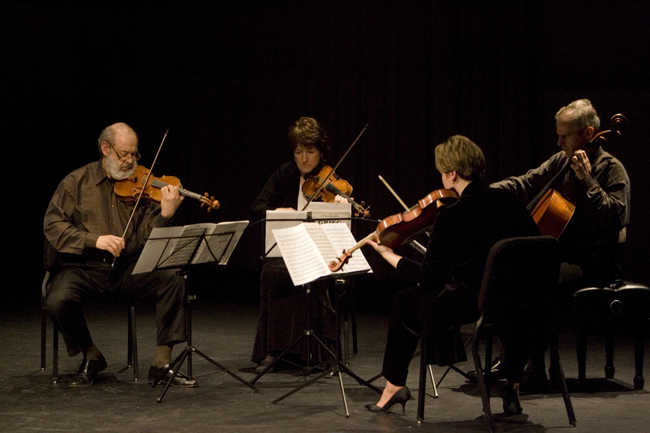 Faculty members across campus are equally impressive in regard to creative accomplishments and engage in hundreds of activities each year. Findings presented in the Academic Program Assessment self-study reveal a substantial amount of activity. For example, faculty in the Department of Theatre reported 237 creative accomplishments, Department of Art faculty presented works in over 600 refereed/juried exhibitions and 262 invited exhibitions around the world, and Department of Music faculty engaged in over 6,400 juried and non-juried performances, exhibits, and related activities. This is an extraordinary contribution by a comprehensive university to the cultural spirit of Iowa, the Midwest, and the world.
Faculty members across campus are equally impressive in regard to creative accomplishments and engage in hundreds of activities each year. Findings presented in the Academic Program Assessment self-study reveal a substantial amount of activity. For example, faculty in the Department of Theatre reported 237 creative accomplishments, Department of Art faculty presented works in over 600 refereed/juried exhibitions and 262 invited exhibitions around the world, and Department of Music faculty engaged in over 6,400 juried and non-juried performances, exhibits, and related activities. This is an extraordinary contribution by a comprehensive university to the cultural spirit of Iowa, the Midwest, and the world.
In addition to individual efforts, there are a number of research centers on campus conducting both applied and pure research. The centers are varied in purpose, housed in departments and colleges across campus, and represent a spectrum of research, outreach, and service learning. A central focus of all centers at UNI is to improve the lives and well-being of the citizens of Iowa and the world. This focus serves the University’s goals of maintaining a faculty distinguished by their scholarship and addressing critical local, state, national, and global needs. [9] In addition to those previously mentioned, a few of the major centers at UNI include the following:
- National Agriculture-Based Lubricants Center
- National Program for Playground Safety
- Roy Eblen Speech & Hearing Clinic
- Northern Iowa Symphony Orchestra
- Center for International Peace & Security Studies
- Textile and Apparel Product Development and Materials Analysis Laboratory
Faculty participation in research and creative activities is a key factor in fostering quality and excellence in professional development and teaching. The Academic Program Assessment provides examples of both the breadth and the depth of these scholarly activities across campus.
Student Research and Co-Curricular Opportunities
Undergraduate and graduate students have many opportunities to conduct original research and engage in creative activities and performances. According to the 2007 administration of the Faculty Survey of Student Engagement (FSSE) at UNI, 59% of faculty who teach first-year students and 54% of faculty who teach seniors believe that work on a research project with a faculty member outside of course or program requirements is important or very important for undergraduates at UNI. [10] Providing research opportunities to undergraduate students is one of the important characteristics of the University. Formal opportunities for undergraduates to conduct original research exist via student research conferences, research seminars and laboratories, and the Honors Program. The University offers two annual research conferences for undergraduate students: the College of Social and Behavioral Sciences Student Research Conference, [11] which focuses primarily on students in the social and behavioral sciences but is open to other disciplines as well; and the Sigma Xi Student Research Conference, [12] open to students in the natural sciences. Students in the Honors Program conduct research and write a thesis as part of the requirement for graduating with an Honors designation. Since May 2004, 129 undergraduate students have completed an Honors thesis and received this designation. Undergraduate students also conduct research with individual faculty or as part of student research teams. [13] Examples of some other significant student research activities are presented below:
- The Ronald E. McNair Post Baccalaureate Achievement Program (McNair Scholars Program) at UNI, part of the federal TRIO Programs, prepares undergraduate students from disadvantaged backgrounds for graduate studies through involvement in research and other scholarly activities. The goal of the program is to increase the number of Ph.D. degrees awarded to underrepresented individuals by providing undergraduates with the skills and confidence to be successful in research fields. Students in this program conduct research projects with faculty mentors and have the opportunity for summer research internships and stipends.
- The College of Business Administration hosts an Undergraduate Research Program designed to provide students with the opportunity to conduct and present research projects with faculty advisors. Students in the program also receive a $750 stipend and the opportunity to present their work at local and national conferences.
- The Department of Physics offers summer research fellowships for students to engage in research activity. The fellowships typically run for ten weeks and offer a $3,000 stipend and $500 supply budget. About ten students a year take advantage of the program, and many present their results at the Sigma Xi conference and national conferences.
- The College of Natural Sciences gives Student Opportunities for Academic Research (SOAR) awards each year to support research activities for undergraduate students in that college. The awards provide a $750 budget to cover costs related to the student’s project. The projects are also included as part of the student’s degree program.
Students are also supported in their efforts to present findings at regional and national conferences. The Office of the Executive Vice-President and Provost, in conjunction with the Northern Iowa Student Government, administers the Intercollegiate Academics Travel Fund, which provides travel support for students and student groups to conferences, competitions, and other scholarly meetings. The Colleges of Social and Behavioral Sciences, Natural Sciences, and Humanities and Fine Arts have dean’s funds established to provide support for student travel. Additionally, many individual departments provide travel support for students in their programs to present research activities at local, regional, national, and, in some cases, even international meetings. Students from UNI are often recognized for their efforts. In 2008 a student in the College of Business Administration was named a finalist for the Global Student Entrepreneur Awards, and was the only student from Iowa selected. Also in 2008 a philosophy student won first prize at the Dartmouth Undergraduate Philosophy Conference, and had a paper accepted for publication in Cornell University’s undergraduate philosophy journal.
Graduate students write research papers, theses, and dissertations as part of their degree programs. Completed research papers are kept in the departments. Theses are kept in departments and Rod Library. Dissertations are kept in the Graduate College office and in the Library. All dissertations completed at UNI since 1996 are available electronically through the ProQuest Dissertations and Theses database.
Beyond these efforts, graduate students also participate in on-campus research conferences as well as national and international professional conferences. Graduate students may participate in the CSBS Student Research Conference and the Sigma Xi Student Research Conference. Additional opportunities, such as the Graduate College Research Symposium and the College of Humanities and Fine Arts Graduate Research Symposium, also support graduate student research activities. Graduate education solidifies the values of life-long learning. Graduate research and creative activities propel innovation, such as work on methods to cast metal without the use of harmful chemicals, and provide important cultural advancements. For example, a recent masters in art graduate gave several exhibitions in Korea, and lectured at two Universities while there.
Lifelong Learning for Staff
Professional & Scientific staff and Merit personnel have access to training grants to help pay for educational credits at an accredited, postsecondary institution. [14] These grants can be used for undergraduate and graduate coursework, but funding is available for a relatively limited number of staff. See Criterion 2, core component 2b, for detailed information on recent funding.
Commitment to Lifelong Learning in the Community
In fall 2005, the University created the Lifelong University to offer non-credit courses to members of the community at a very low cost (fees in fall 2009 ranged from $15-$40 per course). As of June 2010, more than 30 courses have been offered to more than 400 individuals. Courses from one to four weeks long on topics ranging from gardening tips to religious literacy are taught by current or retired University professors. [15]
Summary of Core Component 4a
UNI views the basic functions of the University as “the advancement and dissemination of learning, the development of critical intelligence, creative talent, aesthetic sensibility and moral awareness in its students.” [16] As a result, UNI is committed to providing support for students and faculty in the pursuit and dissemination of knowledge. This is a key indicator that UNI values a life of learning.
Strengths
- A wide variety of awards at UNI for both faculty and students support and recognize research.
- Faculty and staff are increasingly successful in obtaining external grants.
- Research opportunities exist for both graduate and undergraduate students.
Challenges
- The University needs to enhance its program for staff training and development.
- Identify and make available additional travel and professional development funds for faculty, staff, and students.
Back to Top
Core component 4b: The organization demonstrates that acquisition of a breadth of knowledge and skills and the exercise of intellectual inquiry are integral to its educational program.
Globalization, the increasing complexity of society and government, and the increasing pace of economics all produce demands for college graduates with high quality liberal education. UNI recognizes this need for broad, diverse, knowledge founded on communication skills and an ability to think critically. As a result, UNI has designed a curriculum (the Liberal Arts Core) for all students, and provides other diverse opportunities for students to acquire a broad range of knowledge and skills.
Liberal Arts Core
The University of Northern Iowa demonstrates through its Liberal Arts Core (LAC) a commitment to the development of a broad base of knowledge designed to foster critical thinking and lifelong learning. [17] The University Faculty Senate has approved the following statement regarding the “Purposes and Goals of the Liberal Arts Core”:
- The purpose of the Liberal Arts Core (LAC) is to actively engage students to become self-aware participants in their own personal development through thoughtful and informed decision making, promotion of life-long learning, enlarging the scope of their world to global issues and diverse cultures, and increasing their strategies for solving complex problems they will encounter in the future.
- The LAC seeks to attain its purpose through fostering growth in three interrelated areas--skills, knowledge, and perspectives and values.
Skills: Students develop skills in verbal and visual literacy and communication, quantitative and logical
reasoning, information and technological literacy, aesthetic discernment, critical thinking, creativity, problem
solving, and interpersonal and social relationships in diverse linguistic and cultural settings. Courses
throughout the LAC enhance these skills, which provide the tools for intellectual growth, career achievement,
and civic engagement.
Knowledge: Students acquire knowledge of diverse disciplines and realms of human achievement, their
histories, methods, and conceptual frameworks. Thus, LAC courses illuminate the range and
interconnectedness of knowledge and encourage multiple ways of viewing and exploring complex issues.
Perspectives and Values: Students explore diverse cultural values and intellectual perspectives with the skills
and knowledge learned in their LAC courses. These perspectives guide students in their understanding of
and respect for different cultures and principles, their engagement in local, national and global communities,
and their development of innovative approaches to challenges they will face in their personal, social, and
professional lives.
While the LAC is currently under review, UNI has evidence of outcomes related to the current Liberal Arts Core. Responses to the 2007 Faculty Survey of Student Engagement (FSSE) showed that 69% of UNI faculty believed that, for typical students they had taught during the academic year, UNI contributed very much or quite a bit to their acquiring a broad general education. Student responses to survey items related to general education or the Liberal Arts Core also show support for their learning related to the LAC. Seventy-three percent of respondents to the 2009 Graduating Senior Survey agreed or strongly agreed that the “overall quality of most Liberal Arts Core courses is excellent” and nearly 70% agreed or strongly agreed that the Liberal Arts Core had been an important part of their education. Eighty-four percent of seniors responding to the 2009 National Survey of Student Engagement (NSSE) indicated that UNI had contributed very much or quite a bit to their acquiring a broad general education. More specific evidence of learning from the Liberal Arts Core is gained through the assessment activities described in Chapter 2 and Chapter 5.
International Programs
The Office of International Programs (OIP) facilitates international study and exchange programs for UNI students and faculty. [18] UNI believes that experiences on campus, in the community, and around the world prepare the campus community for diverse opportunities and a lifetime of learning. One example is that students can earn Capstone credit for the Liberal Arts Core through study abroad. The OIP seeks to “coordinate programs that bring students from diverse backgrounds into contact with each other utilizing cultural differences as an education resource, [and] provide opportunities for faculty to further develop international collaboration through research and teaching.” [19] Besides sending UNI students abroad, the office is able to facilitate the arrival of international students to campus. Some programs, such as the Graduate Program in Public Policy or programs in the School of Music, are very successful in attracting international students, who are often at the top of their field. For example, an undergraduate flute student from Ecuador recently won the most prestigious student flute competition in the nation, ahead of doctoral students and students at music conservatories. Besides facilitating opportunities for students, the OIP provides resources and support for UNI faculty seeking to teach or conduct research abroad. It maintains lists of faculty who can provide advice, [20] and the office facilitates relationships with international scholars who wish to teach at UNI. UNI hosts about 10 international scholars per year. [21]
National Student Exchange
UNI offers students an opportunity to participate in the National Student Exchange program. This enables students to attend one of more than 180 colleges and universities in the United States, its territories, and Canada, for up to two semesters, while paying UNI tuition. This program exposes students to diverse experiences and new regions of the country and broadens their educational opportunities. Students receive support and advice prior to studying in another location to ensure that credits and grades transfer back to UNI.
Graduate Education
The first goal from the Graduate College’s 2006-2011 Strategic Plan speaks directly to the issue of developing a breadth of knowledge in graduate education. It calls for “a responsive graduate organization that fosters innovation and excellence, facilitates community and promotes the identity of graduate education.” [22] In order to live up to its mission and achieve this goal, the Graduate College sponsors a number of activities and events that are designed to provide a breadth of knowledge and experiences beyond a student’s particular area of study. These include a regular “brown-bag” lecture series, support of the University’s online multidisciplinary journal UNIversitas, and the sponsorship of events for graduate students to enhance the graduate community and promote a diverse academic environment.
A multidisciplinary approach is helpful to ensure students have access to a breadth of knowledge. Like undergraduate majors on campus, many graduate programs include a multidisciplinary component in their curricula, or students are encouraged to take courses outside their discipline. More formally, programs frequently include coursework outside of the department or college in their curricula in order to have access to the expertise of a broader range of faculty. For example, Master of Accounting students may take courses in History, Political Science, and Communication Studies. The program also specifically requires a course outside the Accounting Department in order to further ensure that students develop a breadth of knowledge. UNI has two interdisciplinary master’s degree programs: Women’s and Gender Studies and Public Policy. Both of these programs are housed in the College of Social and Behavioral Sciences, with directors who report to that dean, but do include courses from other colleges.
Summary of Core Component 4b
As a comprehensive university, UNI is committed to providing a high-quality liberal arts education that provides a breadth of knowledge and skills. This is reflected primarily in the centrality of the Liberal Arts Core (LAC) in every academic program but also in the other opportunities and experiences available to students at the University.
Strengths
- The Liberal Arts Core ensures that undergraduates are exposed to a breadth of knowledge.
- Students and faculty have opportunities to study, teach, and conduct research abroad.
- National Student Exchange provides opportunities for students to study at a variety of North American institutions.
- UNI values multidisciplinary education, and links those opportunities to faculty expertise.
Challenges
- Graduate students are sometimes unaware of the breadth of interdisciplinary opportunities available to them.
Back to Top
Core component 4c: The organization assesses the usefulness of its curricula to students who will live and work in a global, diverse, and technological society.
Assessment of curricula is a critical component of ensuring students receive a high-quality education, and graduate with the knowledge and skills necessary for a fast-paced, diverse, and complex society. Since the curricula are in part departmental, college-based, or university-wide, the University of Northern Iowa has a variety of mechanisms to ensure that its programs and the Liberal Arts Core offer rigorous curricula. These mechanisms exist at the department, college, and university levels, and serve to assess the development of appropriate skills in students’ chosen majors. They also ensure that the University provides for the development of broader skills that will help students be successful in a diverse and dynamic society. Although many departments are in the early stages of developing or implementing their outcomes assessment plans, mechanisms still do exist for departments to have rigorous evaluations of their curricula, and they are able to "close the loop" and make changes based on those evaluations. Even the curriculum development process is useful as a way to assess UNI's curricula.
UNI’s curriculum development and review process begins at the department or program level, where proposals for new or revised courses and programs of study are initiated, and then moves to review and endorsement by college senates, deans’ offices, the University Curriculum Committee and/or the Graduate College Curriculum Committee, and the University Faculty Senate. Consultation is required with departments and programs that may be affected by the proposed changes, as well as the Liberal Arts Core Committee, Council on Teacher Education, and Rod Library as appropriate. This process is supported by UNI Curriculum Online, a tool that facilitates the identification of potential impact and consultation. [23] The complete curriculum packet also is reviewed by the Board of Regents. Seldom- and never-offered courses are subject to a regular review process and are deleted from the University catalog to ensure accuracy in reporting curricular offerings. In 2009-2010 the University suspended or terminated 45 majors, minors, and certificates.
Academic Program Review
Each program at the University is evaluated on a regular cycle through the Academic Program Review (APR) process. This normally occurs every seven years, although programs that may be accredited through an outside accrediting organization are evaluated on that accreditation cycle. The first step in the APR process is for the program under review to produce a self-study. This document is a summary of the strengths and weaknesses of the program, particularly regarding curricular matters and including student outcomes assessment (SOA). These self-studies are submitted to the Committee on Academic Program Review (CAPR). [24] Members of the CAPR read the self-studies to ensure that they are clear, frank, and contain the appropriate information that external reviewers need to make a proper evaluation. During this step, program faculty also receive advice on the program’s SOA plan from the Office of Academic Assessment. Once the CAPR is finished with this step and any necessary corrections are made, the program is visited by external evaluators. The external evaluators’ report is used by program faculty to make adjustments and improvements.
Student Outcomes Assessment
Student Outcomes Assessment (SOA) is vital to ensure that program curricula are appropriate and students are actually gaining the skills and knowledge the curricula are designed to teach. SOA plans are designed by the departments and are tailored to fit specific programs. Departments review their SOA plans as a component of the APR process described above; current and archived assessment plans are available on the Web page of the Office of Academic Assessment (OAA). [25] The OAA has also created a cycle for annual reviews or updates of assessment plans between APR reports and submission of summaries of assessment findings to the OAA, so that records of assessment activities are available at both the department/college and university level.
Office of Academic Assessment
The mission of the Office of Academic Assessment (OAA) is to “provide leadership for the planning and implementation of student outcomes assessment, academic program review and other procedures that support academic program improvement, student learning, and accreditation.” [26] The director, along with the SOA Committee, [27] provides advice and feedback as departments develop and refine their SOA plans. By acting as a central resource and information repository for SOA, the Office promotes a culture of assessment.
The OAA is responsible for implementing the National Survey of Student Engagement (NSSE) [28] and the Measure of Academic Proficiency and Progress (MAPP). Data collected from these surveys are also available on the OAA Web site.
Liberal Arts Core Review
Just as individual programs are regularly reviewed, so, too, is the Liberal Arts Core (LAC). The LAC is divided into six categories, and thus each category receives its own review according to a regular cycle. [29] The reviews are performed under oversight of the Liberal Arts Core Committee (LACC), which draws representatives from the five undergraduate colleges, the Library, the Faculty Senate, and the student body. [30] Category reviews have four purposes:
- inform the Liberal Arts Core Committee of the program's operation.
- promote collective adherence to the philosophy of the Liberal Arts Core.
- identify areas of concern and propose solutions.
- review student outcomes assessment plans and data and make recommendations. [31]
These reviews are then submitted to the University Faculty Senate for review and acceptance. Review by the Faculty Senate also gives the rest of the campus an opportunity to discuss the category under review.
Student Surveys
The Office of Institutional Research (OIR) conducts a number of student surveys, including the graduating senior survey, summer school survey, and student satisfaction survey. Data from these surveys are available from the OIR. The University also administers the National Survey of Student Engagement (NSSE), with data from this survey available on the Web site of the Office of Academic Assessment. [32] Data from NSSE and other data are used as measures of student performance related to the goals of the Liberal Arts Core. NSSE data were incorporated into the Foundations of Excellence® self-study on the experiences of first-year students at UNI and are included in the University’s institutional snapshot on the Voluntary System of Accountability College Portrait Web site. [33]
External Review
Aside from regular external reviews through the Academic Program Review process (described above), programs are validated by external constituents in a number of ways. These provide information about the appropriateness of curricula and about the ability of alumni to function effectively in society and the workplace. Department SOA plans often include a survey of alumni. These surveys allow programs to gather information on how students are applying their degrees after graduation.
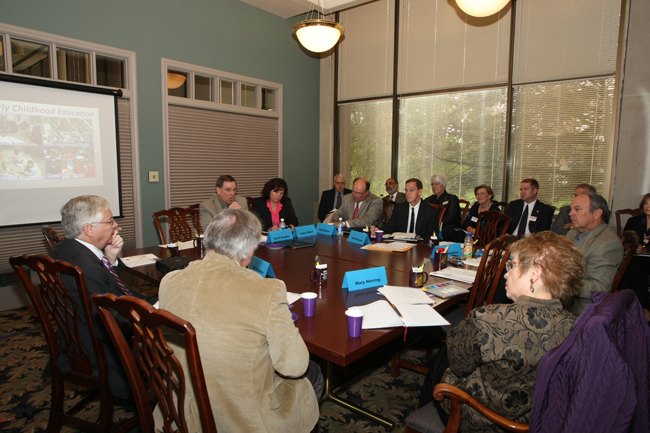
Two colleges (Business Administration [34] and Natural Sciences [35]) have external boards that advise the dean and faculty in order to improve academic programs and serve as advocates for the colleges. The College of Business Administration also has several additional boards that serve to advise specific programs within the college (Accounting, Finance, Management, Marketing, and Real Estate). Numerous programs university-wide are accredited by national professional bodies (see list in Appendix B). The College of Education must conform to standards set by the Iowa Department of Education in developing its curricula in the areas of teacher education, educational leadership, and other fields in public education.
The Board of Regents (BOR) oversees the University of Northern Iowa and reviews the University’s strategic plan, mission, and programs. Academic Program Review assessments are shared with the Board, and program and curricular changes must be approved by the Board.
Independent Learning
Students are expected to master the knowledge and skills necessary for independent learning in programs of applied practice. While student research is a component of this expectation, UNI also recognizes the value of practical experiences in students’ chosen fields as a component of the curriculum. According to the 2009 National Survey of Student Engagement, 77% of first-year students and 80% of seniors reported that their coursework place very much or quite a bit of emphasis on applying theories or concepts to practical problems or in new situations. On the same survey, 80% of seniors reported that UNI had contributed very much or quite a bit to their acquisition of job or work-related knowledge and skills. [36]
Applied undergraduate and graduate programs at UNI have internships, field experiences, and practica as part of their curricular requirements. For example, the undergraduate Public Administration major requires an internship lasting between 160 and 320 hours in a government office or agency, a nonprofit organization, or a charitable organization. The Professional Science Masters programs in Biotechnology, Ecosystem Management, Applied Physics, and Applied Chemistry and Biochemistry require internships with potential employers. Programs in the College of Business Administration also have internship requirements, as do various programs in the College of Humanities and Fine Arts. The College of Education requires most of its majors to complete internships, practica, or student teaching fieldwork, particularly for the licensure of teachers.
The Cooperative Education Program offers all students the opportunity to complete a program that combines formal classroom education with practical work experience. Credit is granted for these experiences, and the program often involves more than one work experience, alternating with time in classes on campus. UNI students have been placed in local, national, and international internships including the Cedar Falls Police Department, the Department of Defense in Washington, D.C., and the British Museum in London.
Summary of Core Component 4c
UNI assesses all of its programs on a regular basis, including the categories of the LAC. Additionally, individual departments have made great progress in developing and implementing outcomes assessment plans.
Strengths
- Program review on a seven-year cycle via the Committee on Academic Program Review ensures that programs engage in rigorous self-examination combined with thorough assessment by external reviewers.
- The Office of Academic Assessment provides centralized support for departments engaged in improving their outcomes assessment strategies.
- The category reviews of the LAC ensure both oversight and opportunities for improvement.
Challenges
- Department outcomes assessment plans across the institution vary in their depth of development and levels of implementation.
Back to Top
Core component 4d: The organization provides support to ensure that faculty, students, and staff acquire, discover, and apply knowledge responsibly.
Support for the responsible acquisition, discovery, and application of knowledge at the University of Northern Iowa is strong. This is reflected in the formal offices on campus that support the work of both faculty and students, as well as more informal efforts of faculty, staff, and administrators to engage each other on issues of academic ethics and academic rigor in courses. The commitment to the responsible discovery and use of knowledge has both regulatory and educational components.
Developing Student Skills and Attitudes
The University offers a variety of resources to support the development of student skills for the proper and responsible use of knowledge. These resources are available through both the Academic Affairs and the Student Affairs divisions. In recognition of the fact that the development of these skills is an ongoing learning process, resources and support through Academic Affairs and Student Affairs are designed to engage students throughout their time at UNI.
Developmental Programs
While rules and regulations are necessary, an important component of the proper use and acquisition of knowledge is the development of the right attitudes and skills. UNI offers a wide variety of programs to help reinforce those attitudes and skills among students and faculty. Examples include UNI’s participation in the American Democracy Project (ADP), the Leadership Studies Program, and the Student Leadership Center. The mission of the ADP includes enhancing skills related to respectfully and honestly communicating information, as well as acting responsibly in the community. [37] The Leadership Studies Program offers students the opportunity to earn a certificate or a minor in Leadership Studies, and the program director also offers leadership workshops on campus for faculty and students. The program emphasizes the responsibilities of individuals in an organization. [38] The Student Leadership Center offers students the chance to develop leadership skills through workshops, conferences, and other events.
Instructional Resources
There are a number of resources available to students to help them in pursuit of their academic goals. The Academic Learning Center (ALC) has a number of programs that assist students in their course work. Through the Writing Center students can arrange an appointment with a trained writing assistant to review writing skills, obtain basic information to avoid plagiarism, and learn how to cite sources using different styles (e.g., APA or MLA). The Writing Center also offers self-help resources on its Web site. This includes information for graduate students on how to cite various forms of sources and help for undergraduates as they gather and cite sources to write a research paper for the first time. Finally, the Writing Center offers support to faculty by means of classroom visits as well as individual and group referrals the instructor can make for students. The Writing Center also offers a page of Internet resources for faculty on the topic of detecting and preventing plagiarism. [39]
The Reading and Learning Center and the Math Center, also administered through the ALC, provide resources to students, faculty, and staff, including consultations for serious reading and math concerns and support of students’ academic activities. Professional staff and Peer Instructors of the Reading and Learning Center develop students’ knowledge, skills, and attitudes through Ask-a-Tutor, non-credit courses, Supportive Seminars in high-risk courses, and study groups.
In addition, the Office of Sponsored Programs [40] oversees compliance with all policies that govern research activities. All projects that involve human participant research must be submitted to the Institutional Review Board for approval, and all investigators and key personnel (students, faculty and staff) who are going to be involved in human subjects research at UNI must provide documentation that they have received training in human research participant protections.
Another method of assisting students in the responsible use of knowledge is the use of Turnitin.com. This Web site compares a work submitted to the site to a large database of Internet content, published works, and student papers. This service may be used as a teaching device so students can learn when it is necessary to cite sources and how to avoid plagiarism when paraphrasing other works. Faculty may also use Turnitin.com as a way to police campus plagiarism, as the Web site can provide feedback very quickly if the instructor suspects a problem. By comparing the work against a far larger database than the instructor could otherwise readily access, the site can be a useful tool for enforcing the University’s academic ethics policies. Turnitin.com, along with the other resources mentioned and individual faculty guidance, provide an array of methods by which students become better informed on the responsible acquisition and application of knowledge.
Faculty Efforts
Several years ago, a number of “campus conversations” on the issues of plagiarism and academic rigor took place. These served as a way for faculty to discuss strategies for teaching students about plagiarism, to search for ways to prevent and police plagiarism, and to discuss ways to improve the quality and impact of the courses offered at UNI. Thus, the conversations were essentially designed to help develop the skills and attitudes necessary for the proper use of knowledge.
These conversations were instrumental in focusing attention on the issue at the departmental level. They also served as a learning mechanism for newer faculty and as a reminder for senior faculty about the University’s policies on academic ethics and academic expectations regarding course content. As a result, some faculty now include detailed information about plagiarism and course expectations in their syllabi. Some departments have developed statements on plagiarism to remind both students and faculty of the obligation to use existing knowledge appropriately and responsibly. [41]
These campus conversations also prompted interest in gathering data from students on their levels of knowledge regarding plagiarism. In fall 2008, a two-question, online survey was administered to students when they registered for spring semester classes to assess their level of understanding of plagiarism as it relates to citation and intent to plagiarize. [42] The results from the survey indicated that, while the majority of students have a good idea of what constitutes plagiarism, international students demonstrated less understanding. As a result of this survey, a presentation on this topic was added to international student orientation in an effort to increase their awareness and understanding and as a proactive measure to assist these students.
Library Resources
Rod Library maintains a Web site about its copyright policies for faculty, staff, and students. [43] The application of copyright to audio-visual resources, interlibrary loan, photocopying, and reserves is explained. The site also provides information on how copyright law works (including issues of fair use and public domain), and guidelines for obtaining copyright permission.
Student Affairs Division
The Office of the Dean of Students within the Student Affairs Division publishes a Student Handbook that states the rights and responsibilities of all students at UNI. This includes the Student Conduct Code (Section 3.02 of the Policies and Procedures) that requires students to be honest, respectful, and responsible in all of their actions. [44]
Policies and Procedures
The University of Northern Iowa has comprehensive, explicit policies and procedures that promote ethical conduct in research and teaching. These policies also provide enforcement mechanisms that create sanctions for the unethical behavior of students and faculty.
Academic Ethics Policies Governing Students
Student behavior regarding academic ethics is governed by Section 3.01 (Academic Ethics/Discipline) of UNI’s Policies and Procedures. [45] This section identifies and describes types of inappropriate conduct, such as cheating and plagiarism; provides penalties that may be imposed by instructors; and provides students with the right to appeal a disciplinary action. Policies and procedures regarding the appeal process are specified in the Undergraduate Student Grievance Policy [46] and the Graduate Grievance Policy. [47]
A comprehensive review of the academic ethics and grievance policies is currently underway by a task force of faculty, staff, and students under the direction of the Associate Provost for Academic Affairs.
Academic Ethics Policies Governing Faculty
Faculty behavior regarding academic ethics is governed by Section 6.10 (Ethics and Academic Responsibility) of UNI’s Policies and Procedures. [48] This section clearly identifies and describes the ethical responsibilities of faculty in conducting their research and teaching their students. This section also identifies the obligations that faculty have to their colleagues, the University, and the community. Section 9.03 of UNI’s Policies and Procedures addresses the issue of conflicts of interest and external funding. [49] This policy is required in order for the university to be eligible for any funding by the National Science Foundation, the National Institutes of Health or any other federal contracts and grants. This policy defines “conflict of interest” and provides for the disclosure to the funding agency of the financial interests of investigators.
Freedom of Expression Safeguards
The University’s policy on freedom of expression (Section 13.10 of the Policies and Procedures) is as follows: “As a university of the state of Iowa, the University of Northern Iowa bears a collective responsibility to ensure that freedom of expression is protected. The university's mission statement declares that ‘[t]he University is committed to providing an optimum level of learning opportunities for the intellectual development of its students, faculty, staff.’ In carrying out these responsibilities, allowances may be made for considerations of reasonable time, place and manner of expression that are content-neutral. To this end, it is the responsibility of every university employee and student to abide by the legal requirements ensuring freedom of expression.” [50]
Oversight and Support of Research Integrity
The Office of Sponsored Programs has a variety of policies and guidelines that further govern research by students or faculty. It provides the University community with information about research compliance that addresses the use of human and animal subjects, research ethics, conflict of interest, and research misconduct. All research projects involving human participants, regardless of the source of funding, must be submitted to the Institutional Review Board (IRB) for approval. The Office of Sponsored Programs provides training in the protection of human research participants and reviews and signs off on proposals involving human participants, survey projects, and the use of data sets. [51] A comprehensive research misconduct policy has recently been developed by the Director of Research Services. [52]
Policies and Practices to Safeguard Intellectual Property
Policies that protect intellectual property rights were recently updated and are implemented by the Office of Intellectual Property, housed jointly within the Office of Sponsored Programs and the Division of Business & Community Services. This office provides information and coordinates efforts on patenting, technology transfer, commercialization, copyright, trademarks, and other means of protecting intellectual property in collaboration with the UNI Research Foundation (UNIRF). An Intellectual Property Officer (IPO) and Intellectual Property Committee (IPC) help “support, promote, and encourage the patenting, copyrighting, trademarking, and licensing of works developed at UNI. The IPC also work to maintain and update the Intellectual Property policy as well as assist with licensing and disbursement of revenue as needed.” [53]
A summary of UNI’s policy to protect intellectual property follows:
The President of the University appoints an Intellectual Property Officer and an Intellectual Property Committee consisting of faculty and staff members who are chosen to serve staggered three-year terms. These individuals assist the Office of Intellectual Property and the UNI Research Foundation (UNIRF) in the protection and management of intellectual properties.
University employees, students, and other individuals using University Facilities in the development of intellectual property and those who receive grant or contract funds through the University are required to assign inventions and patents to the UNI Research Foundation.
The UNIRF agrees to pay inventors a royalty share of the net proceeds for each patent or other intellectual property right assigned to the UNI Research Foundation.
The University will not assert ownership of copyrightable materials produced by faculty members as a part of their normal teaching or scholarly activities at the University unless University ownership is specifically provided for in a related agreement.
A student author of a thesis shall own the thesis copyright but must, as a condition of a degree award, grant royalty-free permission to the University to reproduce and publicly distribute copies of the thesis. [54]
Technology transfer and commercialization follows a set procedure, as outlined below:
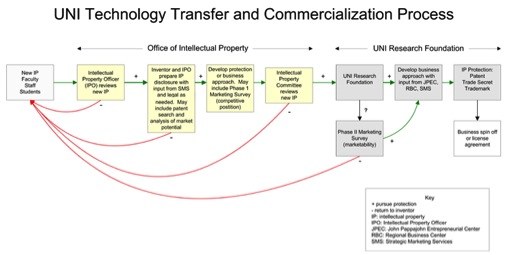
More information on technology transfer and commercialization, including a full description of the stages in the Commercialization Flowchart, is available from the Office of Intellectual Property. [55]
The UNI Trademark Committee is a sub-committee of the Intellectual Property Committee. It has the following roles: [56]
- develops relevant local trademark policies;
- disseminates information to the UNI community concerning national and international trademark law and UNI's trademark policies and procedures;
- advises the Associate Director of Athletics/Business and Licensing concerning trademark issues at UNI;
- responds to inquiries from UNI faculty, students, and administrators regarding trademark-related issues.
The complete policy on intellectual property rights can be found in Section 10.03 of the University’s Policies and Procedures, “Inventions, Patents, Copyrights, and Other Intellectual Properties.” [57] In order to protect the rights of inventors, a disclosure form [58] for the inventor of a new process, device, composition of matter, or combination of products is to be filled out and submitted to the Office of Intellectual Property.
Summary of Core Component 4d
UNI takes academic integrity seriously, and has appropriate policies and resources to address integrity issues. Beyond a regulatory approach, however, UNI also offers support and programs that ensure students, faculty, and staff have opportunities to enhance their leadership skills and to develop a greater understanding of citizenship and ethics.
Strengths
- University policies govern academic integrity, honesty, student conduct, and use of intellectual property.
- The Office of Sponsored Programs provides support of policies that govern inquiry and research.
- Opportunities exist for faculty, staff, and students to participate in projects and programs to enhance skills and attitudes regarding responsible acquisition, discovery, and application of knowledge.
Challenges
- Policies governing student academic ethics, discipline, and grievance procedures are currently under review and undergoing significant revision. These need to be completed and disseminated to the University community.
- Policies regarding research misconduct have recently been updated. It is critical these policies be widely disseminated.
Back to Top
CRITERION FOUR SUMMARY
Research, inquiry, creativity, and responsibility are core to the University’s educational mission. UNI demonstrates this commitment through actions that support faculty development and learning and student research and academic development. The basis of the Liberal Arts Core is designed to provide students a breadth of knowledge and proficiencies, in addition to the focused coursework of the major and minor fields of study. Processes are in place for routine review of programs of study and the Liberal Arts Core to insure that they remain relevant and prepare students for a life of learning.
Student Outcomes Assessment continues to improve across campus. Over the past few years, the Committee on Academic Program Review (CAPR) has used the review process as a way to improve SOA plans of programs. The CAPR works with the director of the Office of Academic Assessment to gather SOA plans, provide feedback on them, and direct programs to the Office for additional support if necessary.
Policies governing proper use of knowledge are currently being reviewed by a team of faculty, administrators, and students to ensure they are clear. The University will continue its efforts to educate faculty, staff, and students on the proper acquisition and use of knowledge.
Improving the access of non-teaching staff to development grants is a challenge in the current budget environment. The University recognizes the importance of lifelong learning opportunities for non-teaching staff, but it is unclear if funding for these grants can be markedly increased in the near future.
Although there is room for improvement, the University of Northern Iowa does promote a life of learning for its faculty, administration, staff, and students. Through a wide variety of programs and offices, the University fosters and supports inquiry, creativity, practice, and social responsibility for the entire campus community.
Below is a summary of strengths and areas for continuing University improvement:
Strengths
- Substantial resources for faculty development exist.
- The Liberal Arts Core provides a strong foundation for undergraduate education.
- The Liberal Arts Core Review Steering Committee is conducting a comprehensive review of the program.
- Opportunities exist for students to engage in study elsewhere in the United States and study abroad.
- There are regular, rigorous reviews of all academic programs on campus, including the components of the Liberal Arts Core.
- Faculty care deeply about and are supportive of a high-quality Liberal Arts Core.
- Program reviews involve an external review component as well as student outcomes assessment, supported by the Office of Academic Assessment.
- The Office of Academic Assessment is a resource for the development of assessment policies and strategies at both university and program levels.
- The Committee on Academic Program Review continues to add value to the development of Student Outcomes Assessment practices.
Areas for Improvement
- Support of professional development for non-teaching staff lags behind resources available to faculty.
- The University needs to ensure that the Liberal Arts Core fully addresses the needs of students.
- The sophistication of student outcomes assessment is uneven across programs.
- Plagiarism policies need to be clarified and widely disseminated.
- Policies governing the proper use of knowledge have recently been updated and need to be widely disseminated.
Recommendations
- A comprehensive plan for the dissemination of assessment results should be developed so that data and information can be better utilized for decision making and program improvement.
- The unevenness in student outcomes assessment plans across programs needs to be addressed.
- Inequities in faculty travel support should be addressed, and student travel support should be reviewed.

